
Paul Gauguin Painting Reproductions 1 of 8
1848-1903
French Post-Impressionist Painter
Paul Gauguin is a French post-impressionist painter (Paris, 1848 - Atuona, Marquesas Islands, 1903).
A traveller at heart, Paul Gauguin's artistic career was a transition between Impressionism and Symbolism. Through his forms and colors, he was a decisive influence on the Fauvist and Expressionist painters.
From his early childhood in Peru, Paul Gauguin retained his taste for the unfamiliar. In 1865 he joined the navy, but on the advice of his tutor Gustave Arosa (a collector of paintings) he left in 1871 to work for a Parisian securities broker.
Married in 1873 to the Danish Mette-Sophie Gadd, by whom he had five children, he painted on Sundays and attended the academy founded by the Italian Filippo Colarossi. Camille Pizarro, a friend of Arosa's, advised and encouraged him to participate in Impressionist exhibitions from 1879; he then invited him to work in Pontoise with Jean-Baptiste Armand Guillaumin and Paul Cézanne, whose example encouraged Gauguin to break away from Impressionism.
In late 1883, driven out of the bourse by the economic crisis, Gauguin first tried to support himself by painting in Rouen, where Pissarro and Claude Monet maintained contacts with wealthy art lovers, before deciding to set up business in Denmark. He was unsuccessful and returned to Paris in 1885 without wife and children. His fate was preordained: for years he continued to dream of business, but painting became his life.
On his return from his first trip to Pont-Aven in 1886, Gauguin exhibited the paintings he had brought back, along with those from the Rouen and Denmark periods, with their rich, muted tones.
In the following year, during his stay in Martinique, where he tried his hand at planting, he painted discreetly pointillist canvases in which the exoticism and colour that his memories of Peru and his sea voyages had imprinted on his memory (Seashore) emerge.
Gauguin's second visit to Pont-Aven was in 1888. Long discussions with the young Emile Bernard gave rise to a new aesthetic that contrasted neo-impressionism with synthetism (pure colours laid flat, dark rings), of which Vision after the Sermon (1888) - or Jacob's Struggle with the Angel - is the most obvious work.
During this period Gauguin became a leader of the Symbolist school, and from November to December 1888 he spent a break in Arles with Vincent Van Gogh and produced a series of brilliant canvases ('Aliscamps'). Gauguin left Van Gogh after the latter suffered a severe attack of madness. La Belle Angèle (1889) and Le Christ vert (1889) reflect the plastic and moral problems of this period, which was followed by his first trip to Tahiti (1891-1893).
Paul Gauguin's life was divided between Europe and the tropics. It was Polynesia that gave him a new creative force, making him the first great artist to appreciate and study the arts we now call "primitive", and then hand over the keys to them to the West.
"I am going away to calm myself, to free myself from the influence of civilization," Gauguin declared before setting sail for Tahiti in the spring of 1891. "For this purpose I must immerse myself in the virgin nature [...] without any other care than to transmit, like a child, the conceptions of my brain by means of the primitive means of art alone, the only good, the only true ones."
In Tahiti, Gauguin discovered the relatively pristine world of his dreams (Femmes de Tahiti, 1891). But fearing both intrigue and oblivion, he returned to Paris as soon as he had enough new paintings to participate in an exhibition with Durand-Ruel.
After seeing his works, Stéphane Malarmé is astonished to find "so many mysteries in so much brilliance." Not only writers, including August Strindberg and Charles Morris, with whom he wrote his autobiography Noa-Noa (1897), but also musicians came to his studio.
However, financial success came slowly. He lost a lawsuit, there was a brawl in Concarneau where sailors taunted his companion Ana la Javan, and Gauguin, fed up with Europe, left for Tahiti in 1895.
In Polynesia, the confused religiosity of Breton works gave way to great myths (pleasure, fear, death) and massive forms in saturated colours. The joy of returning to one's roots floods the paintings of 1896 (Jours délicieux), and then grief creeps in (Nevermore, 1897).
Suffering and depressed by the news of his daughter Aline's death, Gauguin contemplates suicide. Where do we come from? What are we? Where Are We Going (1897) became his testament.
The renewed enthusiasm that followed his move to the village of Atuona on the island of Hiva-Oa in the Marquesas (1901) produced masterpieces that convey his sense of a paradisiacal universe (Contes barbares, 1902). Gauguin also created sculptures. But exhausted by illness, alcohol and constant disputes with local authorities, he died shortly before the age of 55.
A traveller at heart, Paul Gauguin's artistic career was a transition between Impressionism and Symbolism. Through his forms and colors, he was a decisive influence on the Fauvist and Expressionist painters.
From his early childhood in Peru, Paul Gauguin retained his taste for the unfamiliar. In 1865 he joined the navy, but on the advice of his tutor Gustave Arosa (a collector of paintings) he left in 1871 to work for a Parisian securities broker.
Married in 1873 to the Danish Mette-Sophie Gadd, by whom he had five children, he painted on Sundays and attended the academy founded by the Italian Filippo Colarossi. Camille Pizarro, a friend of Arosa's, advised and encouraged him to participate in Impressionist exhibitions from 1879; he then invited him to work in Pontoise with Jean-Baptiste Armand Guillaumin and Paul Cézanne, whose example encouraged Gauguin to break away from Impressionism.
In late 1883, driven out of the bourse by the economic crisis, Gauguin first tried to support himself by painting in Rouen, where Pissarro and Claude Monet maintained contacts with wealthy art lovers, before deciding to set up business in Denmark. He was unsuccessful and returned to Paris in 1885 without wife and children. His fate was preordained: for years he continued to dream of business, but painting became his life.
On his return from his first trip to Pont-Aven in 1886, Gauguin exhibited the paintings he had brought back, along with those from the Rouen and Denmark periods, with their rich, muted tones.
In the following year, during his stay in Martinique, where he tried his hand at planting, he painted discreetly pointillist canvases in which the exoticism and colour that his memories of Peru and his sea voyages had imprinted on his memory (Seashore) emerge.
Gauguin's second visit to Pont-Aven was in 1888. Long discussions with the young Emile Bernard gave rise to a new aesthetic that contrasted neo-impressionism with synthetism (pure colours laid flat, dark rings), of which Vision after the Sermon (1888) - or Jacob's Struggle with the Angel - is the most obvious work.
During this period Gauguin became a leader of the Symbolist school, and from November to December 1888 he spent a break in Arles with Vincent Van Gogh and produced a series of brilliant canvases ('Aliscamps'). Gauguin left Van Gogh after the latter suffered a severe attack of madness. La Belle Angèle (1889) and Le Christ vert (1889) reflect the plastic and moral problems of this period, which was followed by his first trip to Tahiti (1891-1893).
Paul Gauguin's life was divided between Europe and the tropics. It was Polynesia that gave him a new creative force, making him the first great artist to appreciate and study the arts we now call "primitive", and then hand over the keys to them to the West.
"I am going away to calm myself, to free myself from the influence of civilization," Gauguin declared before setting sail for Tahiti in the spring of 1891. "For this purpose I must immerse myself in the virgin nature [...] without any other care than to transmit, like a child, the conceptions of my brain by means of the primitive means of art alone, the only good, the only true ones."
In Tahiti, Gauguin discovered the relatively pristine world of his dreams (Femmes de Tahiti, 1891). But fearing both intrigue and oblivion, he returned to Paris as soon as he had enough new paintings to participate in an exhibition with Durand-Ruel.
After seeing his works, Stéphane Malarmé is astonished to find "so many mysteries in so much brilliance." Not only writers, including August Strindberg and Charles Morris, with whom he wrote his autobiography Noa-Noa (1897), but also musicians came to his studio.
However, financial success came slowly. He lost a lawsuit, there was a brawl in Concarneau where sailors taunted his companion Ana la Javan, and Gauguin, fed up with Europe, left for Tahiti in 1895.
In Polynesia, the confused religiosity of Breton works gave way to great myths (pleasure, fear, death) and massive forms in saturated colours. The joy of returning to one's roots floods the paintings of 1896 (Jours délicieux), and then grief creeps in (Nevermore, 1897).
Suffering and depressed by the news of his daughter Aline's death, Gauguin contemplates suicide. Where do we come from? What are we? Where Are We Going (1897) became his testament.
The renewed enthusiasm that followed his move to the village of Atuona on the island of Hiva-Oa in the Marquesas (1901) produced masterpieces that convey his sense of a paradisiacal universe (Contes barbares, 1902). Gauguin also created sculptures. But exhausted by illness, alcohol and constant disputes with local authorities, he died shortly before the age of 55.
183 Gauguin Paintings
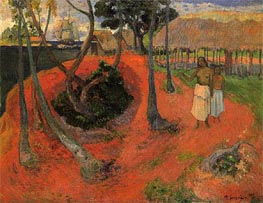
Idyll in Tahiti 1901
Oil Painting
$861
$861
Canvas Print
$75.95
$75.95
SKU: GAP-2990
Paul Gauguin
Original Size: 74.5 x 94.5 cm
E.G. Buehrle, Zurich, Switzerland
Paul Gauguin
Original Size: 74.5 x 94.5 cm
E.G. Buehrle, Zurich, Switzerland
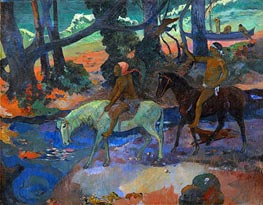
The Ford (Flight) 1901
Oil Painting
$875
$875
Canvas Print
$77.59
$77.59
SKU: GAP-2991
Paul Gauguin
Original Size: 73 x 92 cm
Pushkin Museum of Fine Arts, Moscow, Russia
Paul Gauguin
Original Size: 73 x 92 cm
Pushkin Museum of Fine Arts, Moscow, Russia
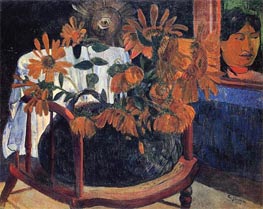
Sunflowers 1901
Oil Painting
$784
$784
Canvas Print
$77.77
$77.77
SKU: GAP-2992
Paul Gauguin
Original Size: 73 x 92 cm
The State Hermitage Museum, St. Petersburg, Russia
Paul Gauguin
Original Size: 73 x 92 cm
The State Hermitage Museum, St. Petersburg, Russia
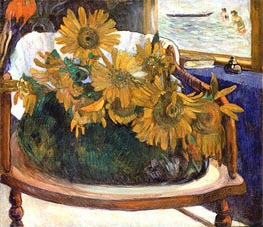
Still Life with Sunflowers on an Armchair 1901
Oil Painting
$821
$821
Canvas Print
$87.17
$87.17
SKU: GAP-2993
Paul Gauguin
Original Size: 68 x 75.5 cm
E.G. Buehrle, Zurich, Switzerland
Paul Gauguin
Original Size: 68 x 75.5 cm
E.G. Buehrle, Zurich, Switzerland
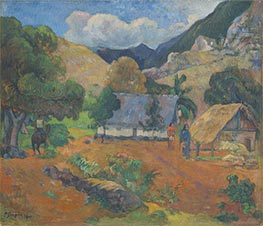
Landscape with Three Figures 1901
Oil Painting
$743
$743
Canvas Print
$85.36
$85.36
SKU: GAP-2994
Paul Gauguin
Original Size: 67.3 x 77.4 cm
Carnegie Museum of Art, Pittsburgh, USA
Paul Gauguin
Original Size: 67.3 x 77.4 cm
Carnegie Museum of Art, Pittsburgh, USA
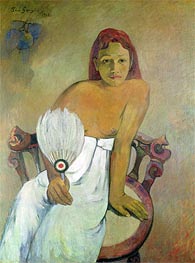
Girl with a Fan 1902
Oil Painting
$875
$875
Canvas Print
$73.60
$73.60
SKU: GAP-2995
Paul Gauguin
Original Size: 91 x 73 cm
Museum Folkwang, Essen, Germany
Paul Gauguin
Original Size: 91 x 73 cm
Museum Folkwang, Essen, Germany
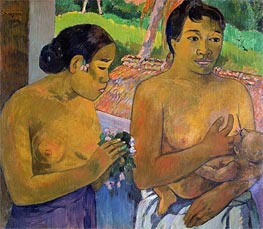
The Offering 1902
Oil Painting
$864
$864
Canvas Print
$86.45
$86.45
SKU: GAP-2996
Paul Gauguin
Original Size: 68 x 78 cm
E.G. Buehrle, Zurich, Switzerland
Paul Gauguin
Original Size: 68 x 78 cm
E.G. Buehrle, Zurich, Switzerland
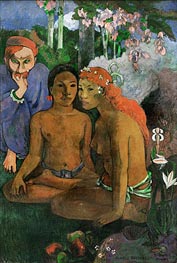
Conted Barbares (Primitive Tales) 1902
Oil Painting
$909
$909
Canvas Print
$67.09
$67.09
SKU: GAP-2997
Paul Gauguin
Original Size: 130 x 91.5 cm
Museum Folkwang, Essen, Germany
Paul Gauguin
Original Size: 130 x 91.5 cm
Museum Folkwang, Essen, Germany
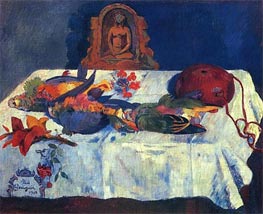
Still Life with Parrots 1902
Oil Painting
$751
$751
Canvas Print
$79.75
$79.75
SKU: GAP-2998
Paul Gauguin
Original Size: 62 x 76 cm
Pushkin Museum of Fine Arts, Moscow, Russia
Paul Gauguin
Original Size: 62 x 76 cm
Pushkin Museum of Fine Arts, Moscow, Russia
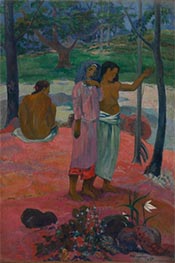
The Call 1902
Oil Painting
$767
$767
Canvas Print
$66.91
$66.91
SKU: GAP-2999
Paul Gauguin
Original Size: 131.3 x 89.5 cm
Cleveland Museum of Art, Ohio, USA
Paul Gauguin
Original Size: 131.3 x 89.5 cm
Cleveland Museum of Art, Ohio, USA
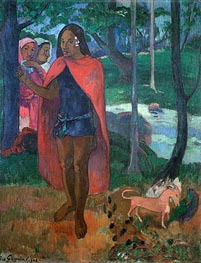
The Magician of Hivaoa 1902
Oil Painting
$784
$784
Canvas Print
$75.95
$75.95
SKU: GAP-3000
Paul Gauguin
Original Size: 92 x 73 cm
Musée des beaux-arts, Liege, Belgium
Paul Gauguin
Original Size: 92 x 73 cm
Musée des beaux-arts, Liege, Belgium
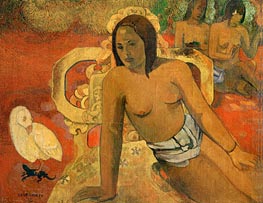
Vairumati 1897
Oil Painting
$694
$694
Canvas Print
$65.63
$65.63
SKU: GAP-3001
Paul Gauguin
Original Size: 73 x 94 cm
Musee d'Orsay, Paris, France
Paul Gauguin
Original Size: 73 x 94 cm
Musee d'Orsay, Paris, France
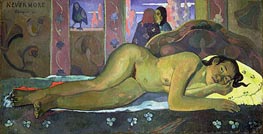
Nevermore, Oh Tahiti 1897
Oil Painting
$909
$909
Canvas Print
$65.63
$65.63
SKU: GAP-3002
Paul Gauguin
Original Size: 60.5 x 116 cm
Courtauld Institute of Art, London, UK
Paul Gauguin
Original Size: 60.5 x 116 cm
Courtauld Institute of Art, London, UK

Where do We Come From. What are We Doing. Where ... 1897
Oil Painting
$1209
$1209
Canvas Print
$65.63
$65.63
SKU: GAP-3003
Paul Gauguin
Original Size: 139.1 x 374.6 cm
Boston Museum of Fine Arts, Massachusetts, USA
Paul Gauguin
Original Size: 139.1 x 374.6 cm
Boston Museum of Fine Arts, Massachusetts, USA
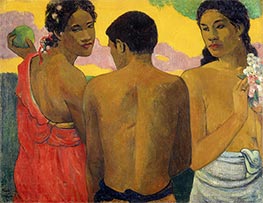
Three Tahitians 1898
Oil Painting
$720
$720
Canvas Print
$76.87
$76.87
SKU: GAP-3004
Paul Gauguin
Original Size: 73 x 94 cm
National Galleries of Scotland, Edinburgh, UK
Paul Gauguin
Original Size: 73 x 94 cm
National Galleries of Scotland, Edinburgh, UK
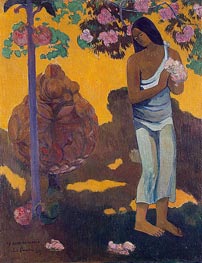
The Month of Mary (Te avae no Maria) 1899
Oil Painting
$950
$950
Canvas Print
$76.14
$76.14
SKU: GAP-3005
Paul Gauguin
Original Size: 96 x 74.5 cm
The State Hermitage Museum, St. Petersburg, Russia
Paul Gauguin
Original Size: 96 x 74.5 cm
The State Hermitage Museum, St. Petersburg, Russia
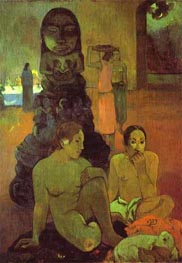
The Great Buddha 1899
Oil Painting
$848
$848
Canvas Print
$69.26
$69.26
SKU: GAP-3006
Paul Gauguin
Original Size: 134 x 95 cm
Pushkin Museum of Fine Arts, Moscow, Russia
Paul Gauguin
Original Size: 134 x 95 cm
Pushkin Museum of Fine Arts, Moscow, Russia
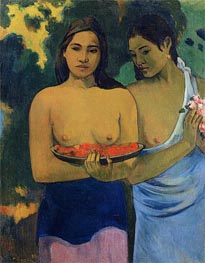
Two Tahitian Women 1899
Oil Painting
$767
$767
Canvas Print
$77.04
$77.04
SKU: GAP-3007
Paul Gauguin
Original Size: 94 x 72.4 cm
Metropolitan Museum of Art, New York, USA
Paul Gauguin
Original Size: 94 x 72.4 cm
Metropolitan Museum of Art, New York, USA
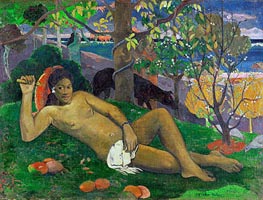
Te Arii Vahine (The King's Wife) 1896
Oil Painting
$893
$893
Canvas Print
$75.42
$75.42
SKU: GAP-3008
Paul Gauguin
Original Size: 97 x 130 cm
Pushkin Museum of Fine Arts, Moscow, Russia
Paul Gauguin
Original Size: 97 x 130 cm
Pushkin Museum of Fine Arts, Moscow, Russia
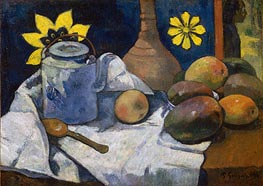
Still Life with Teapot and Fruit 1896
Oil Painting
$611
$611
Canvas Print
$70.53
$70.53
SKU: GAP-3009
Paul Gauguin
Original Size: 47.6 x 66 cm
Metropolitan Museum of Art, New York, USA
Paul Gauguin
Original Size: 47.6 x 66 cm
Metropolitan Museum of Art, New York, USA
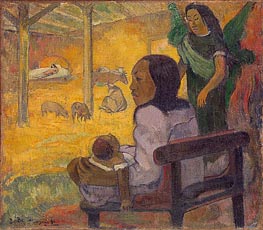
Be Be (The Nativity) 1896
Oil Painting
$795
$795
Canvas Print
$86.63
$86.63
SKU: GAP-3010
Paul Gauguin
Original Size: 67 x 76.5 cm
The State Hermitage Museum, St. Petersburg, Russia
Paul Gauguin
Original Size: 67 x 76.5 cm
The State Hermitage Museum, St. Petersburg, Russia
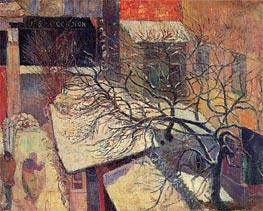
Paris in the Snow 1894
Oil Painting
$861
$861
Canvas Print
$79.94
$79.94
SKU: GAP-3011
Paul Gauguin
Original Size: 72 x 88 cm
Van Gogh Museum, Amsterdam, Netherlands
Paul Gauguin
Original Size: 72 x 88 cm
Van Gogh Museum, Amsterdam, Netherlands
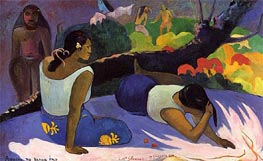
Arearea no vareua ino (Pleasures of the Evil Spirit) 1894
Oil Painting
$837
$837
Canvas Print
$65.63
$65.63
SKU: GAP-3012
Paul Gauguin
Original Size: 60 x 98 cm
Ny Carlsberg Glyptotek, Copenhagen, Denmark
Paul Gauguin
Original Size: 60 x 98 cm
Ny Carlsberg Glyptotek, Copenhagen, Denmark
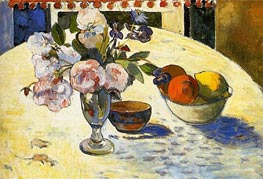
Flowers and a Bowl of Fruit 1894
Oil Painting
$712
$712
Canvas Print
$67.46
$67.46
SKU: GAP-3013
Paul Gauguin
Original Size: 43.2 x 63 cm
Boston Museum of Fine Arts, Massachusetts, USA
Paul Gauguin
Original Size: 43.2 x 63 cm
Boston Museum of Fine Arts, Massachusetts, USA